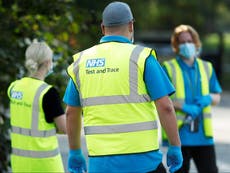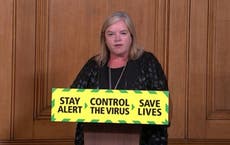Without a vaccine, the UK may never develop an effective system to tackle coronavirus
As issues continue to plague the ‘world-beating’ test and trace system, perhaps we should get used to these unpredictable stop-start lockdowns

Sometimes there are times when people, and indeed nations, have to accept the inevitable. I’ve a friend, for example, who, at the age of 43 and with some years treading water in am-dram, has finally realised she’s never going to make it big in Hollywood. I myself now know I’ll never be the next Kimi Raikkonen.
Maybe Britain should finally accept with the same good grace and clear, if belated, clear headedness that it is never going to be in possession of a working test and trace system for Covid-19. Sure, we’ve made some progress, but nowhere near enough to call our spatchcock, unreliable, slow, piecemeal, patchy system “world beating”. Like building ships and brewing lager, developing a test and trace system is something other countries do much better than we do.
Maybe it’s Boris Johnson’s fault, or Baroness (Dido) Harding’s. Or Public Health England. Or Serco. Or privatisation. Or Matt Hancock. Or the last Labour government. You can blame who you like. The point remains: We ought to give up on it and accept the grim facts on the ground. What then?
Logically, that ought to mean we should also abandon the lockdowns. This is because lockdowns do not in themselves get rid of coronavirus. They merely freeze the spread of the virus, and buy us some time to, erm, deliver a comprehensive rapid test and trace system that would really suppress Covid. Does anyone think a two or three week lockdown now - the “circuit breaker” - would be enough time to get test and trace working? If only.
Without test and trace we know what happens. When the lockdown is relaxed, the virus gradually makes its return and its exponential growth rate starts killing us all over again. Without testing and tracing as the first line of defence, lockdowns are mostly about postponing deaths rather than saving lives. This is, of course, exactly what has happened over the last six months or so. Our summer was a bit of a fool’s paradise; we thought we were winning. Johnson told us it would be gone in 12 weeks. The sombrero was being squashed; the mole whacked; things would be more normal by Christmas.
The sacrifice and effort put into the first lockdown was squandered while Britain budgeted £12bn on moonshots and apps that failed.
The only caveat to all that is that lockdowns do protect local hospitals from being overwhelmed, so they do have to be imposed for that reason, as now in the north west of England. Saying they don’t work doesn’t mean they should be abandoned because the death rate would end up at intolerable levels, and the economic damage would be far worse.
Covid cannot be cordoned off from the old and vulnerable. But it is fair to say that lockdowns do nothing to deal with the basic trend of infections, unless they are backed by test and trace. Like with medicines, lockdowns are almost palliatives, dealing with and limiting the symptoms of an illness rather than actually curing it; they have their uses, and valuable ones, yet we should always understand their limitations.
So perhaps we should get used to our unpredictable stop-go lockdowns, national and local, long and short, until the vaccine comes to our rescue (and developing vaccines is something Britain is relatively good at). The stop-go lockdown, then, is the “new normal”, with the British muddling through, making a virtue of necessity, accepting that this time their organisational inadequacies cannot be compensated for by their gift for improvisation. The next year, in other words, will be very much like the last six months. We’ll get used to it.



Join our commenting forum
Join thought-provoking conversations, follow other Independent readers and see their replies
Comments